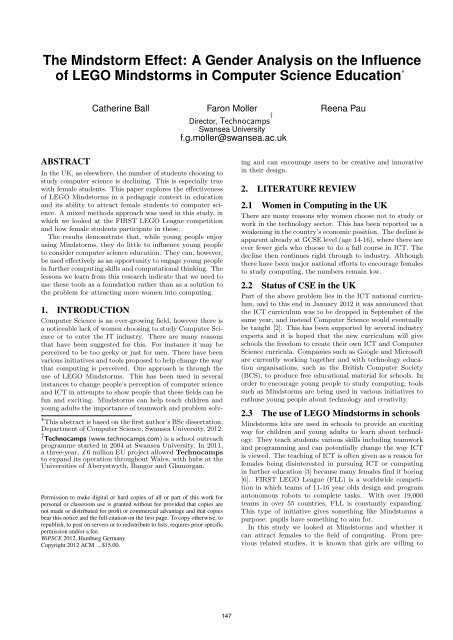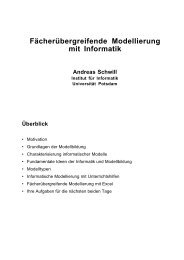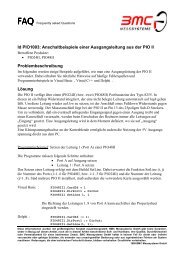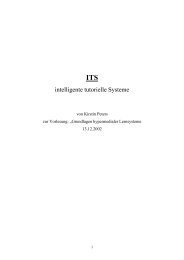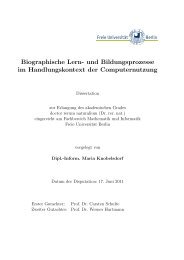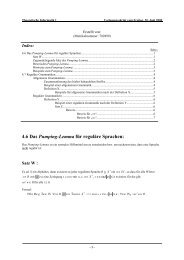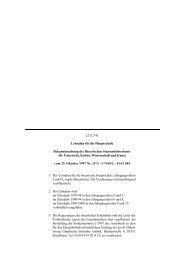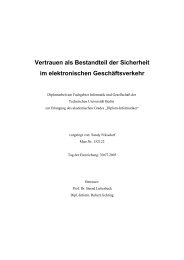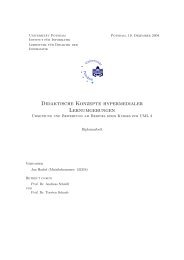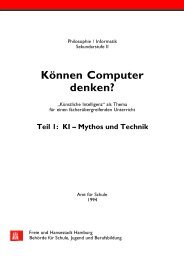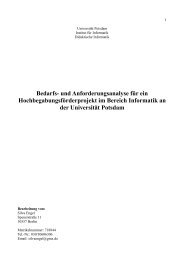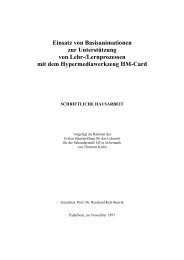Maria Knobelsdorf, University of Dortmund, Germany - Didaktik der ...
Maria Knobelsdorf, University of Dortmund, Germany - Didaktik der ...
Maria Knobelsdorf, University of Dortmund, Germany - Didaktik der ...
You also want an ePaper? Increase the reach of your titles
YUMPU automatically turns print PDFs into web optimized ePapers that Google loves.
The Mindstorm Effect: A Gen<strong>der</strong> Analysis on the Influence<br />
<strong>of</strong> LEGO Mindstorms in Computer Science Education ∗<br />
ABSTRACT<br />
Catherine Ball Faron Moller<br />
Director, Technocamps †<br />
In the UK, as elsewhere, the number <strong>of</strong> students choosing to<br />
study computer science is declining. This is especially true<br />
with female students. This paper explores the effectiveness<br />
<strong>of</strong> LEGO Mindstorms in a pedagogic context in education<br />
and its ability to attract female students to computer science.<br />
A mixed methods approach was used in this study, in<br />
which we looked at the FIRST LEGO League competition<br />
and how female students participate in these.<br />
The results demonstrate that, while young people enjoy<br />
using Mindstorms, they do little to influence young people<br />
to consi<strong>der</strong> computer science education. They can, however,<br />
be used effectively as an opportunity to engage young people<br />
in further computing skills and computational thinking. The<br />
lessons we learn from this research indicate that we need to<br />
use these tools as a foundation rather than as a solution to<br />
the problem for attracting more women into computing.<br />
1. INTRODUCTION<br />
Computer Science is an ever-growing field, however there is<br />
a noticeable lack <strong>of</strong> women choosing to study Computer Science<br />
or to enter the IT industry. There are many reasons<br />
that have been suggested for this. For instance it may be<br />
perceived to be too geeky or just for men. There have been<br />
various initiatives and tools proposed to help change the way<br />
that computing is perceived. One approach is through the<br />
use <strong>of</strong> LEGO Mindstorms. This has been used in several<br />
instances to change people’s perception <strong>of</strong> computer science<br />
and ICT in attempts to show people that these fields can be<br />
fun and exciting. Mindstorms can help teach children and<br />
young adults the importance <strong>of</strong> teamwork and problem solv-<br />
∗ This abstract is based on the first author’s BSc dissertation,<br />
Department <strong>of</strong> Computer Science, Swansea <strong>University</strong>, 2012.<br />
† Technocamps (www.technocamps.com) is a school outreach<br />
programme started in 2004 at Swansea <strong>University</strong>. In 2011,<br />
a three-year, £6 million EU project allowed Technocamps<br />
to expand its operation throughout Wales, with hubs at the<br />
Universities <strong>of</strong> Aberystwyth, Bangor and Glamorgan.<br />
Permission to make digital or hard copies <strong>of</strong> all or part <strong>of</strong> this work for<br />
personal or classroom use is granted without fee provided that copies are<br />
not made or distributed for pr<strong>of</strong>it or commercial advantage and that copies<br />
bear this notice and the full citation on the first page. To copy otherwise, to<br />
republish, to post on servers or to redistribute to lists, requires prior specific<br />
permission and/or a fee.<br />
WiPSCE 2012, Hamburg <strong>Germany</strong><br />
Copyright 2012 ACM ...$15.00.<br />
Swansea <strong>University</strong><br />
f.g.moller@swansea.ac.uk<br />
147<br />
Reena Pau<br />
ing and can encourage users to be creative and innovative<br />
in their design.<br />
2. LITERATURE REVIEW<br />
2.1 Women in Computing in the UK<br />
There are many reasons why women choose not to study or<br />
work in the technology sector. This has been reported as a<br />
weakening in the country’s economic position. The decline is<br />
apparent already at GCSE level (age 14-16), where there are<br />
ever fewer girls who choose to do a full course in ICT. The<br />
decline then continues right through to industry. Although<br />
there have been major national efforts to encourage females<br />
to study computing, the numbers remain low.<br />
2.2 Status <strong>of</strong> CSE in the UK<br />
Part <strong>of</strong> the above problem lies in the ICT national curriculum,<br />
and to this end in January 2012 it was announced that<br />
the ICT curriculum was to be dropped in September <strong>of</strong> the<br />
same year, and instead Computer Science would eventually<br />
be taught [2]. This has been supported by several industry<br />
experts and it is hoped that the new curriculum will give<br />
schools the freedom to create their own ICT and Computer<br />
Science curricula. Companies such as Google and Micros<strong>of</strong>t<br />
are currently working together and with technology education<br />
organisations, such as the British Computer Society<br />
(BCS), to produce free educational material for schools. In<br />
or<strong>der</strong> to encourage young people to study computing, tools<br />
such as Mindstorms are being used in various initiatives to<br />
enthuse young people about technology and creativity.<br />
2.3 The use <strong>of</strong> LEGO Mindstorms in schools<br />
Mindstorms kits are used in schools to provide an exciting<br />
way for children and young adults to learn about technology.<br />
They teach students various skills including teamwork<br />
and programming and can potentially change the way ICT<br />
is viewed. The teaching <strong>of</strong> ICT is <strong>of</strong>ten given as a reason for<br />
females being disinterested in pursuing ICT or computing<br />
in further education [3] because many females find it boring<br />
[6]. FIRST LEGO League (FLL) is a worldwide competition<br />
in which teams <strong>of</strong> 11-16 year olds design and program<br />
autonomous robots to complete tasks. With over 19,000<br />
teams in over 55 countries, FLL is constantly expanding.<br />
This type <strong>of</strong> initiative gives something like Mindstorms a<br />
purpose: pupils have something to aim for.<br />
In this study we looked at Mindstorms and whether it<br />
can attract females to the field <strong>of</strong> computing. From previous<br />
related studies, it is known that girls are willing to


